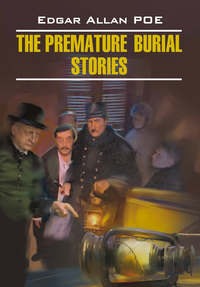 полная версия
полная версияThe Complete Stories of Edgar Allan Poe
The shutting of a door disturbed me, and, looking up, I found that my cousin had departed from the chamber. But from the disordered chamber of my brain, had not, alas! departed, and would not be driven away, the white and ghastly spectrum of the teeth. Not a speck on their surface – not a shade on their enamel – not an indenture in their edges – but what that brief period of her smile had sufficed to brand in upon my memory. I saw them now even more unequivocally than I beheld them then. The teeth! – the teeth! – they were here, and there, and everywhere, and visibly and palpably before me; long, narrow, and excessively white, with the pale lips writhing about them, as in the very moment of their first terrible development. Then came the full fury of my monomania, and I struggled in vain against its strange and irresistible influence. In the multiplied objects of the external world I had no thoughts but for the teeth. For these I longed with a frenzied desire. All other matters and all different interests became absorbed in their single contemplation. They – they alone were present to the mental eye, and they, in their sole individuality, became the essence of my mental life. I held them in every light. I turned them in every attitude. I surveyed their characteristics. I dwelt upon their peculiarities. I pondered upon their conformation. I mused upon the alteration in their nature. I shuddered as I assigned to them, in imagination, a sensitive and sentient power, and, even when unassisted by the lips, a capability of moral expression. Of Mademoiselle Salle it has been well said, “Que tous ses pas etaient des sentiments,” and of Berenice I more seriously believed que tous ses dents etaient des idees. Des idees! – ah, here was the idiotic thought that destroyed me! Des idees! – ah, therefore it was that I coveted them so madly! I felt that their possession could alone ever restore me to peace, in giving me back to reason.
And the evening closed in upon me thus – and then the darkness came, and tarried, and went – and the day again dawned – and the mists of a second night were now gathering around – and still I sat motionless in that solitary room – and still I sat buried in meditation – and still the phantasma of the teeth maintained its terrible ascendancy, as, with the most vivid hideous distinctness, it floated about amid the changing lights and shadows of the chamber. At length there broke in upon my dreams a cry as of horror and dismay; and thereunto, after a pause, succeeded the sound of troubled voices, intermingled with many low moanings of sorrow or of pain. I arose from my seat, and throwing open one of the doors of the library, saw standing out in the ante-chamber a servant maiden, all in tears, who told me that Berenice was – no more! She had been seized with epilepsy in the early morning, and now, at the closing in of the night, the grave was ready for its tenant, and all the preparations for the burial were completed.
I found myself sitting in the library, and again sitting there alone. It seemed that I had newly awakened from a confused and exciting dream. I knew that it was now midnight, and I was well aware, that since the setting of the sun, Berenice had been interred. But of that dreary period which intervened I had no positive, at least no definite comprehension. Yet its memory was replete with horror – horror more horrible from being vague, and terror more terrible from ambiguity. It was a fearful page in the record my existence, written all over with dim, and hideous, and unintelligible recollections. I strived to decypher them, but in vain; while ever and anon, like the spirit of a departed sound, the shrill and piercing shriek of a female voice seemed to be ringing in my ears. I had done a deed – what was it? I asked myself the question aloud, and the whispering echoes of the chamber answered me, – “what was it? “
On the table beside me burned a lamp, and near it lay a little box. It was of no remarkable character, and I had seen it frequently before, for it was the property of the family physician; but how came it there, upon my table, and why did I shudder in regarding it? These things were in no manner to be accounted for, and my eyes at length dropped to the open pages of a book, and to a sentence underscored therein. The words were the singular but simple ones of the poet Ebn Zaiat: – “Dicebant mihi sodales si sepulchrum amicae visitarem, curas meas aliquantulum fore levatas.” Why then, as I perused them, did the hairs of my head erect themselves on end, and the blood of my body become congealed within my veins?
There came a light tap at the library door – and, pale as the tenant of a tomb, a menial entered upon tiptoe. His looks were wild with terror, and he spoke to me in a voice tremulous, husky, and very low. What said he? – some broken sentences I heard. He told of a wild cry disturbing the silence of the night – of the gathering together of the household – of a search in the direction of the sound; and then his tones grew thrillingly distinct as he whispered me of a violated grave – of a disfigured body enshrouded, yet still breathing – still palpitating – still alive!
He pointed to garments; they were muddy and clotted with gore. I spoke not, and he took me gently by the hand: it was indented with the impress of human nails. He directed my attention to some object against the wall. I looked at it for some minutes: it was a spade. With a shriek I bounded to the table, and grasped the box that lay upon it. But I could not force it open; and, in my tremor, it slipped from my hands, and fell heavily, and burst into pieces; and from it, with a rattling sound, there rolled out some instruments of dental surgery, intermingled with thirty-two small, white, and ivory-looking substances that were scattered to and fro about the floor.
THE END
Bon-Bon (1835)
Quand un bon vin meuble mon estomac,Je suis plus savant que Balzac —Plus sage que Pibrac;Mon bras seul faisant l’attaqueDe la nation Cossaque,La mettroit au sac;De Charon Je passerois le lacEn dormant dans son bac;J’irois au fier Eac,Sans que mon cœur fit tic ni tac,Presenter du tabac.– French Vaudeville.
That Pierre Bon-Bon was a restaurateur of uncommon qualifications, no man who, during the reign of —, frequented the little Câfé in the cul-de-sac Le Febvre at Rouen, will, I imagine, feel himself at liberty to dispute. That Pierre Bon-Bon was, in an equal degree, skilled in the philosophy of that period is, I presume, still more especially undeniable. His patés à la fois were beyond doubt immaculate; but what pen can do justice to his essays sur la Nature – his thoughts sur l’Ame – his observations sur l’Esprit? If his omelettes – if his fricandeaux were inestimable, what littérateur of that day would not have given twice as much for an “Idée de Bon-Bon” as for all the trash of “Idées” of all the rest of the savants? Bon-Bon had ransacked libraries which no other man had ransacked – had read more than any other would have entertained a notion of reading – had understood more than any other would have conceived the possibility of understanding; and although, while he flourished, there were not wanting some authors at Rouen to assert “that his dicta evinced neither the purity of the Academy, nor the depth of the Lyceum” – although, mark me, his doctrines were by no means very generally comprehended, still it did not follow that they were difficult of comprehension. It was, I think, on account of their self-evidency that many persons were led to consider them abstruse. It is to Bon-Bon – but let this go no farther – it is to Bon-Bon that Kant himself is mainly indebted for his metaphysics. The former was indeed not a Platonist, nor strictly speaking an Aristotelian – nor did he, like the modern Leibnitz, waste those precious hours which might be employed in the invention of a fricasée, or, facili gradú, the analysis of a sensation, in frivolous attempts at reconciling the obstinate oils and waters of ethical discussion. Not at all. Bon-Bon was Ionic – Bon-Bon was equally Italic. He reasoned à priori – He reasoned also à posteriori. His ideas were innate – or otherwise. He believed in George of Trebizond – He believed in Bessarion. Bon-Bon was emphatically a – Bon-Bonist.
I have spoken of the philosopher in his capacity of restaurateur. I would not, however, have any friend of mine imagine that, in fulfilling his hereditary duties in that line, our hero wanted a proper estimation of their dignity and importance. Far from it. It was impossible to say in which branch of his profession he took the greater pride. In his opinion the powers of the intellect held intimate connection with the capabilities of the stomach. I am not sure, indeed, that he greatly disagreed with the Chinese, who hold that the soul lies in the abdomen. The Greeks at all events were right, he thought, who employed the same words for the mind and the diaphragm. By this I do not mean to insinuate a charge of gluttony, or indeed any other serious charge to the prejudice of the metaphysician. If Pierre Bon-Bon had his failings – and what great man has not a thousand? – if Pierre Bon-Bon, I say, had his failings, they were failings of very little importance – faults indeed which, in other tempers, have often been looked upon rather in the light of virtues. As regards one of these foibles, I should not even have mentioned it in this history but for the remarkable prominency – the extreme alto relievo – in which it jutted out from the plane of his general disposition. – He could never let slip an opportunity of making a bargain.
Not that he was avaricious – no. It was by no means necessary to the satisfaction of the philosopher, that the bargain should be to his own proper advantage. Provided a trade could be effected – a trade of any kind, upon any terms, or under any circumstances – a triumphant smile was seen for many days thereafter to enlighten his countenance, and a knowing wink of the eye to give evidence of his sagacity.
At any epoch it would not be very wonderful if a humor so peculiar as the one I have just mentioned, should elicit attention and remark. At the epoch of our narrative, had this peculiarity not attracted observation, there would have been room for wonder indeed. It was soon reported that, upon all occasions of the kind, the smile of Bon-Bon was wont to differ widely from the downright grin with which he would laugh at his own jokes, or welcome an acquaintance. Hints were thrown out of an exciting nature; stories were told of perilous bargains made in a hurry and repented of at leisure; and instances were adduced of unaccountable capacities, vague longings, and unnatural inclinations implanted by the author of all evil for wise purposes of his own.
The philosopher had other weaknesses – but they are scarcely worthy our serious examination. For example, there are few men of extraordinary profundity who are found wanting in an inclination for the bottle. Whether this inclination be an exciting cause, or rather a valid proof, of such profundity, it is a nice thing to say. Bon-Bon, as far as I can learn, did not think the subject adapted to minute investigation; – nor do I. Yet in the indulgence of a propensity so truly classical, it is not to be supposed that the restaurateur would lose sight of that intuitive discrimination which was wont to characterize, at one and the same time, his essais and his omelettes. In his seclusions the Vin de Bourgogne had its allotted hour, and there were appropriate moments for the Côtes du Rhone. With him Sauterne was to Medoc what Catullus was to Homer. He would sport with a syllogism in sipping St. Peray, but unravel an argument over Clos de Vougeot, and upset a theory in a torrent of Chambertin. Well had it been if the same quick sense of propriety had attended him in the peddling propensity to which I have formerly alluded – but this was by no means the case. Indeed, to say the truth, that trait of mind in the philosophic Bon-Bon did begin at length to assume a character of strange intensity and mysticism, and appeared deeply tinctured with the diablerie of his favorite German studies.
To enter the little Câfe in the Cul-de-Sac Le Febvre was, at the period of our tale, to enter the sanctum of a man of genius. Bon-Bon was a man of genius. There was not a sous-cuisinier in Rouen, who could not have told you that Bon-Bon was a man of genius. His very cat knew it, and forebore to whisk her tail in the presence of the man of genius. His large water-dog was acquainted with the fact, and upon the approach of his master, betrayed his sense of inferiority by a sanctity of deportment, a debasement of the ears, and a dropping of the lower jaw not altogether unworthy of a dog. It is, however, true that much of this habitual respect might have been attributed to the personal appearance of the metaphysician. A distinguished exterior will, I am constrained to say, have its weight even with a beast; and I am willing to allow much in the outward man of the restaurateur calculated to impress the imagination of the quadruped. There is a peculiar majesty about the atmosphere of the little great – if I may be permitted so equivocal an expression – which mere physical bulk alone will be found at all times inefficient in creating. If, however, Bon-Bon was barely three feet in height, and if his head was diminutively small, still it was impossible to behold the rotundity of his stomach without a sense of magnificence nearly bordering upon the sublime. In its size both dogs and men must have seen a type of his acquirements – in its immensity a fitting habitation for his immortal soul.
I might here – if it so pleased me – dilate upon the matter of habiliment, and other mere circumstances of the external metaphysician. I might hint that the hair of our hero was worn short, combed smoothly over his forehead, and surmounted by a conical-shaped white flannel cap and tassels – that his pea-green jerkin was not after the fashion of those worn by the common class of restaurateurs at that day – that the sleeves were something fuller than the reigning costume permitted – that the cuffs were turned up, not as usual in that barbarous period, with cloth of the same quality and color as the garment, but faced in a more fanciful manner with the particolored velvet of Genoa – that his slippers were of a bright purple, curiously filigreed, and might have been manufactured in Japan, but for the exquisite pointing of the toes, and the brilliant tints of the binding and embroidery – that his breeches were of the yellow satin-like material called aimable – that his sky-blue cloak, resembling in form a dressing-wrapper, and richly bestudded all over with crimson devices, floated cavalierly upon his shoulders like a mist of the morning – and that his tout ensemble gave rise to the remarkable words of Benevenuta, the Improvisatrice of Florence, “that it was difficult to say whether Pierre Bon-Bon was indeed a bird of Paradise, or the rather a very Paradise of perfection.” – I might, I say, expatiate upon all these points if I pleased; – but I forbear: – merely personal details may be left to historical novelists; – they are beneath the moral dignity of matter-of-fact.
I have said that “to enter the Câfé in the Cul-de-Sac Le Febvre was to enter the sanctum of a man of genius” – but then it was only the man of genius who could duly estimate the merits of the sanctum. A sign, consisting of a vast folio, swung before the entrance. On one side of the volume was painted a bottle; on the reverse a pate. On the back were visible in large letters Œuvres de Bon-Bon. Thus was delicately shadowed forth the twofold occupation of the proprietor.
Upon stepping over the threshold, the whole interior of the building presented itself to view. A long, low-pitched room, of antique construction, was indeed all the accommodation afforded by the Càfe. In a corner of the apartment stood the bed of the metaphysician. An array of curtains, together with a canopy à la Greque, gave it an air at once classic and comfortable. In the corner diagonary opposite, appeared, in direct family communion, the properties of the kitchen and the bibliotheque. A dish of polemics stood peacefully upon the dresser. Here lay an oven-full of the latest ethics – there a kettle of dudecimo melanges. Volumes of German morality were hand and glove with the gridiron – a toasting fork might be discovered by the side of Eusebius – Plato reclined at his ease in the frying pan – and contemporary manuscripts were filed away upon the spit.
In other respects the Càfe de Bon-Bon might be said to differ little from the usual restaurants of the period. A large fireplace yawned opposite the door. On the right of the fireplace an open cupboard displayed a formidable array of labelled bottles.
It was here, about twelve o’clock one night, during the severe winter of —, that Pierre Bon-Bon, after having listened for some time to the comments of his neighbors upon his singular propensity – that Pierre Bon-Bon, I say, having turned them all out of his house, locked the door upon them with an oath, and betook himself in no very pacific mood to the comforts of a leather-bottomed arm-chair, and a fire of blazing faggots.
It was one of those terrific nights which are only met with once or twice during a century. It snowed fiercely, and the house tottered to its centre with the floods of wind that, rushing through the crannies in the wall, and pouring impetuously down the chimney, shook awfully the curtains of the philosopher’s bed, and disorganized the economy of his patépans and papers. The huge folio sign that swung without, exposed to the fury of the tempest, creaked ominously, and gave out a moaning sound from its stanchions of solid oak.
It was in no placid temper, I say, that the metaphysician drew up his chair to its customary station by the hearth. Many circumstances of a perplexing nature had occurred during the day, to disturb the serenity of his meditations. In attempting des œufs à la Princesse, he had unfortunately perpetrated an omelette à la Reine; the discovery of a principle in ethics had been frustrated by the overturning of a stew; and last, not least, he had been thwarted in one of those admirable bargains which he at all times took such especial delight in bringing to a successful termination. But in the chafing of his mind at these unaccountable vicissitudes, there did not fail to be mingled some degree of that nervous anxiety which the fury of a boisterous night is so well calculated to produce. Whistling to his more immediate vicinity the large black water-dog we have spoken of before, and settling himself uneasily in his chair, he could not help casting a wary and unquiet eye towards those distant recesses of the apartment whose inexorable shadows not even the red fire-light itself could more than partially succeed in overcoming. Having completed a scrutiny whose exact purpose was perhaps unintelligible to himself, he drew close to his seat a small table covered with books and papers, and soon became absorbed in the task of retouching a voluminous manuscript, intended for publication on the morrow.
He had been thus occupied for some minutes, when “I am in no hurry, Monsieur Bon-Bon,” suddenly whispered a whining voice in the apartment.
“The devil!” ejaculated our hero, starting to his feet, overturning the table at his side, and staring around him in astonishment.
“Very true,” calmly replied the voice.
“Very true! – what is very true? – how came you here?” vociferated the metaphysician, as his eye fell upon something which lay stretched at full-length upon the bed.
“I was saying,” said the intruder, without attending to the interrogatives, “I was saying, that I am not at all pushed for time – that the business upon which I took the liberty of calling, is of no pressing importance – in short, that I can very well wait until you have finished your Exposition.”
“My Exposition! – there now! – how do you know? – how came you to understand that I was writing an Exposition? – good God!”
“Hush!” replied the figure, in a shrill under tone; and, arising quickly from the bed, he made a single step towards our hero, while an iron lamp that depended overhead swung convulsively back from his approach.
The philosopher’s amazement did not prevent a narrow scrutiny of the stranger’s dress and appearance. The outlines of his figure, exceedingly lean, but much above the common height, were rendered minutely distinct by means of a faded suit of black cloth which fitted tight to the skin, but was otherwise cut very much in the style of a century ago. These garments had evidently been intended for a much shorter person than their present owner. His ankles and wrists were left naked for several inches. In his shoes, however, a pair of very brilliant buckles gave the lie to the extreme poverty implied by the other portions of his dress. His head was bare, and entirely bald, with the exception of a hinder-part, from which depended a queue of considerable length. A pair of green spectacles, with side glasses, protected his eyes from the influence of the light, and at the same time prevented our hero from ascertaining either their color or their conformation. About the entire person there was no evidence of a shirt; but a white cravat, of filthy appearance, was tied with extreme precision around the throat, and the ends, hanging down formally side by side, gave (although I dare say unintentionally) the idea of an ecclesiastic. Indeed, many other points both in his appearance and demeanor might have very well sustained a conception of that nature. Over his left ear, he carried, after the fashion of a modern clerk, an instrument resembling the stylus of the ancients. In a breast-pocket of his coat appeared conspicuously a small black volume fastened with clasps of steel. This book, whether accidentally or not, was so turned outwardly from the person as to discover the words “Rituel Catholique ” in white letters upon the back. His entire physiognomy was interestingly saturnine – even cadaverously pale. The forehead was lofty, and deeply furrowed with the ridges of contemplation. The corners of the mouth were drawn down into an expression of the most submissive humility. There was also a clasping of the hands, as he stepped towards our hero – a deep sigh – and altogether a look of such utter sanctity as could not have failed to be unequivocally preposessing. Every shadow of anger faded from the countenance of the metaphysician, as, having completed a satisfactory survey of his visiter’s person, he shook him cordially by the hand, and conducted him to a seat.
There would however be a radical error in attributing this instantaneous transition of feeling in the philosopher, to any one of those causes which might naturally be supposed to have had an influence. Indeed, Pierre Bon-Bon, from what I have been able to understand of his disposition, was of all men the least likely to be imposed upon by any speciousness of exterior deportment. It was impossible that so accurate an observer of men and things should have failed to discover, upon the moment, the real character of the personage who had thus intruded upon his hospitality. To say no more, the conformation of his visiter’s feet was sufficiently remarkable – he maintained lightly upon his head an inordinately tall hat – there was a tremulous swelling about the hinder part of his breeches – and the vibration of his coat tail was a palpable fact. Judge, then, with what feelings of satisfaction our hero found himself thrown thus at once into the society of a person for whom he had at all times entertained the most unqualified respect. He was, however, too much of the diplomatist to let escape him any intimation of his suspicions in regard to the true state of affairs. It was not his cue to appear at all conscious of the high honor he thus unexpectedly enjoyed; but, by leading his guest into the conversation, to elicit some important ethical ideas, which might, in obtaining a place in his contemplated publication, enlighten the human race, and at the same time immortalize himself – ideas which, I should have added, his visiter’s great age, and well-known proficiency in the science of morals, might very well have enabled him to afford.
Actuated by these enlightened views, our hero bade the gentleman sit down, while he himself took occasion to throw some faggots upon the fire, and place upon the now re-established table some bottles of Mousseux. Having quickly completed these operations, he drew his chair vis-à-vis to his companion’s, and waited until the latter should open the conversation. But, plans even the most skilfully matured, are often thwarted in the outset of their application – and the restaurateur found himself nonplussed by the very first words of his visiter’s speech.









